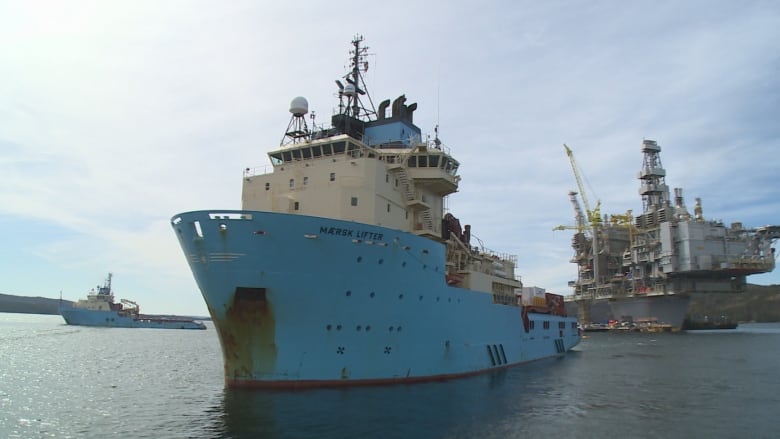Costs adding up as Hebron tow-out delay continues, but no one's panicking yet
Massive concrete platform ready to sail, but Mother Nature has other ideas

A wonder of modern engineering and a fleet of powerful tugs are pinned inside Trinity Bay by a massive blanket of densely packed sea ice, and Mother Nature does not seem ready to open a lane for the Hebron oil platform.
It's got some of us wondering what the delay is costing ExxonMobil and its partners, so we asked the company just that.
Answer?
That's commercial information. In other words, none of our business.
So we did some digging on our own.
Here's what we know.
The Hebron platform has been ready to sail for nearly two weeks, set to become Newfoundland and Labrador's fourth standalone producing oil field.
But its route is filled with ice drifting south from Baffin Bay.
As of Tuesday there were six tow vessels connected to the 750,000-tonne platform. Another two vessels will be connected when the time comes to start moving Hebron. And three more vessels are supporting tow-related activity at Bull Arm.
That's 11 specialized ships, most with a crew of between 12 and 15 people.

And they don't come cheap. A source tells CBC News that an anchor handling tug supply vessel can cost between $40,000 and $70,000 per day.
With a fleet this size, that means a bill of anywhere from $440,000 to nearly $800,000 per day just for marine support.
And for every week the tow-out is delayed, that means up to $5.4 million in added costs — not including fuel.
An expert tells CBC one of these ships can burn through two to eight tonnes of fuel per day even in standby mode.
Millions of barrels of oil ready to be pumped
And consider what's about to happen once the ice moves off.
These ships will slowly and carefully tow the Hebron platform 350 kilometres southeast of St. John's, delicately sit it down on the seabed, and begin pumping heavy crude by the end of this year. Seven hundred million barrels, waiting to be extracted over the next 30 years.
This monumental movement is not without its risks, so just imagine what the insurance bill must be for moving a $14-billion oil platform through the hostile North Atlantic.
We've all complained lately about rising insurance rates, but the premiums on this move will be "astronomical," said an oil industry insider.
The atmosphere is also very different on the platform these days.
After years of construction activity, with thousands of workers plying their trades on this concrete and steel behemoth, relative quiet has settled over Hebron.
Just 90 workers are onboard, keeping the platform in a state of readiness to tow when the appropriate weather window presents itself.
Pack ice not unexpected
That said, nothing in the oil industry comes cheap, especially when that oil must be pumped from beneath the ocean.
So don't expect bean counters at ExxonMobil to be in their offices, pulling out their hair over this delay.
The appearance of pack ice off the island's east coast is not unusual, and though not ideal, was likely planned for.
"This was all built into the costs," said a source.
So now it's a waiting game. Waiting for the winds to change and push the ice offshore.
"We anticipate tow could happen within the next couple of weeks," an ExxonMobil official wrote in an email.
And how much will that tow cost?
None of your business.

